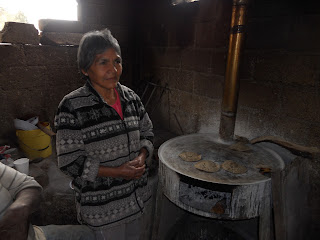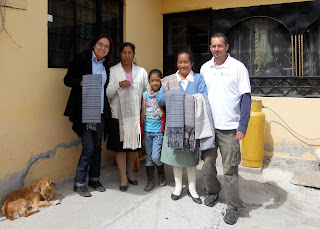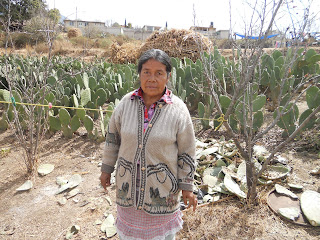 |
| I resisted the tempatation to grab one of those tortillas |
 |
| His only job: haul water when needed |
 |
| They make many flavors of atole here |
 |
| Mexico is a country of contrasts |
 |
| Shawls |
 |
| La Nopalera |
 |
| My two Kiva coordinators |
| Thursday morning I met my two Kiva coordinators at the metro station Observatorio right next to the bus station. Before boarding I bought a quesadilla to eat on board. It's probably not what you think. A quesadilla is crispy here like a rolled taco, and it came with a ton of nopales on top. If you don't know what those are, hold on a sec.
The two hour bus ride to Atlacomulco was scenic. First we passed through Santa Fe, the rich neighborhood on the western edge of Mexico City. There are tall modern skyscrapers with signs that say "Microsoft" and "Chrysler" and so on. Then the highway starts climbing, and you pass through pine forest, see a few mansions in the hills and recreational areas. Then there's Toluca, the large industrial capital of the state of Mexico. Our bus went around it -- going through it looks like it would have taken a long time!
There were apparently no cheap options for buses. In Guatemala I pay around $4 to sit in a crowded "chicken bus" for a 3 hour journey. Here it was more than twice that, but very cushy with a movie and reclining seats.
An hour later we were there in the office. I met the staff, five of us hopped in a car and off we drove to visit borrowers.
First, a lady who grows cactus. Mexicans eat a lot of prickly pear branch. When it's young and tender, they remove the thorns, chop it up and stir-fry it and serve it on top of just about anything. That's what nopales or nopalitos are.
This lady was very comfortable talking about her life and her business. Being able to borrow (despite interest rates that would make many people uncomfortable -- more on this another day!) has made a huge difference in her life. She uses the money to buy things to sell at retail (for example, when she doesn't have enough cactus to sell, she'll buy from neighbors and sell that at the market), buy plants to grow food and cash crops, buy manure, and to improve her house.
The second visit was an hour away. This lady uses her loan to buy shawls to sell in the market. She does very well. The shawls are not cheap, around $50 - $80. If she sells two per week, she's doing well. She was so clear-spoken and energetic I wanted to take a video of her, but she laughed and said no, that Kiva lenders wouldn't loan her any more money if they heard her talking. She has two children in middle school and a nine year-old in fourth grade. I told her about my goddaughter (ahijada) in Guatemala, how she didn't start school until she was ten. The shawl vendor laughed and said they were going to make me the godfather of her daughter, and have a big party. Everyone except me howled. I said "er... ah..." and turned red.
The third visit, another hour away, was a lady who makes tortillas. Like the other two, she was very much at ease talking to this group of loan officers, office people from the city and a crazy gringo. She was also very bright, energetic and full of life. Her grandchildren looked prosperous in their blue school uniforms.
We got back to the city at nine, making it a twelve hour day. It went by in no time, and I can hardly wait to go to Lerma next week!
|
I love the little guy whose only job is to haul water when needed. What a life! And soon, I'll be like La Nopalera!
ReplyDeleteYou're taller!
ReplyDelete